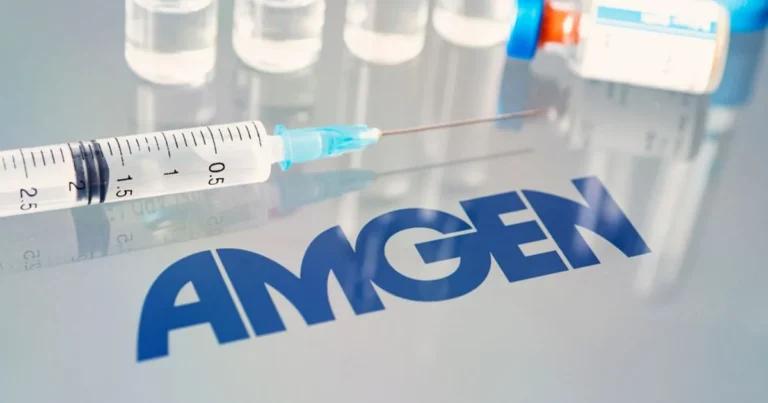
Amgen’s MariTide provides a groundbreaking weight loss drug as an alternative to Novo Nordisk’s Wegovy and Eli Lilly’s Zepbound. In a Phase I trial, data suggest that Amgen’s maridebart cafraglutide (MariTide) may allow patients to take lower and less frequent doses over time while still maintaining significant weight loss. Let’s explore how MariTide works, its effects on the body, and insights into how it could revolutionize weight loss treatment, and provide future benefits.
Mechanism of action
MariTide has a dual mechanism of action, that affects both GLP-1 and GIP (glucose-dependent insulinotropic polypeptide) receptors. This section looks into the specifics of how MariTide functions.
Maritide is designed to simultaneously activate the GLP-1 receptor and antagonize the GIP receptor, a unique combination that has shown promise in preclinical and early-stage clinical studies.
GLP-1 (glucagon-like peptide-1) is a hormone that plays a crucial role in regulating blood sugar levels and appetite. By activating the GLP-1 receptors, MariTide can enhance insulin secretion, slow gastric emptying, and promote feelings of fullness, leading to a reduced calorie intake and subsequent weight loss. On the other hand, GIP antagonism is an additional strategy, as it can further enhance the weight loss effects by reducing the body’s ability to store excess calories as fat.
The dual action of these two mechanisms is what sets MariTide apart from other obesity treatments currently on the market or in development. By targeting these pathways simultaneously, the molecule aims to deliver a more potent and durable weight loss response. This could potentially offer a more effective solution for individuals struggling with obesity.
Design of MariTide
MariTide is a bispecific molecule:
- It has been designed by joining a fully human monoclonal anti-human GIPR antagonist antibody with two GLP-1 analogue agonist peptides. This structure allows MariTide to remain in the body longer compared to other weekly weight-loss injections
The interaction between MariTide and the receptors involves complex internal processes crucial for effective metabolic regulation in the body. Through these mechanisms, MariTide not only helps in weight loss, but also contributes to the overall metabolic health of individuals.
Effects on weight loss
Clinical trial outcomes
- Initial weight loss:In phase 1 clinical trials published in the journal Nature Metabolism, MariTide showed significant weight reduction. Participants receiving the highest dose of 840 mg experienced an average weight loss of 8.2% by Day 92
- Extended dosing results:Those in the multiple-dose arm, receiving 420 mg every 30 days for three months, saw an even more noticeable weight loss, averaging 14.5% by Day 85
Comparison with other GLP-1 agonists
- Studies indicate that while competitors like Wegovy and Zepbound show 15% to 21% body weight loss after one year, MariTide offers more durable weight management without the significant weight rebound often associated with other treatments
Long-term efficacy and safety
- The sustained efficacy of MariTide is highlighted by the maintenance of substantial weight loss, with participants maintaining a 11.2% reduction up to 150 days post-treatment. This suggests its potential as a long-term obesity management solution
Dosing flexibility
- Early-stage data suggests that MariTide’s dosing could potentially be reduced and administered less frequently over time. This could provide a significant advantage in terms of patient compliance and ongoing management of obesity
Summary of weight loss benefits
- MariTide not only initiates significant weight loss but also sustained weight loss over an extended period, placing it as a better option in the GLP-1 class of drugs for obesity management
Benefits beyond weight loss with GLP-1 drugs
- Cardiovascular effects:GLP-1 agonists like semaglutide have shown a reduction in cardiovascular events in older patients with elevated HbA1c levels, though these benefits do not extend to decreased cardiovascular mortality
- Neuroprotective effects:Liraglutide has the ability to cross the hematoencephalic barrier, offering neuroprotective effects that could be important in treating neurodegenerative diseases and aiding recovery
- Blood pressure reduction:Early treatment phases with GLP-1 agonists such as exenatide and liraglutide have shown a reduction in blood pressure among diabetic patients. This effect can be explained due to the inhibition of the renin-angiotensin-aldosterone system and improvement in endothelial function
- Enhanced endothelial responses:The direct activation of specific receptors in vascular tissue by GLP-1 agonists supports endothelial function, further contributing to cardiovascular health
Cardiovascular risk factors
- GLP-1 agonists also regulate several other cardiovascular risk factors including endothelial dysfunction, arterial blood pressure, dyslipidemia, and platelet function. This additional affect suggests a broader therapeutic potential for MariTide beyond simple glucose regulation or obesity management
Long-term use of GLP-1 agonists
- It is important to note that significant weight loss achieved through GLP-1 agonists can lead to rapid weight gain upon cessation of the drug. This underscores the need for careful management and potential long-term use considerations to maintain therapeutic benefits
Overview of safety and tolerability
MariTide, administered via a handheld auto-injector once a month or less, has demonstrated an acceptable safety profile across various clinical trials. The tolerability of MariTide is similar to other GLP-1 drugs, with manageable gastrointestinal side effects.
Common side effects
Gastrointestinal symptoms:
- The most frequently reported side effects were mild nausea and vomiting
- These symptoms were common but typically reduced after the initial doses
Comparison with other GLP-1 drugs:
- The safety and side effects profile of MariTide matches closely with that of other drugs in the GLP-1 drug category, primarily involving gastrointestinal issues
Conclusion
We have looked at how MariTide, a promising obesity drug works through its dual mechanism of action with GLP-1 and GIP receptors. This unique approach sets MariTide apart in treating obesity and also provides alternative solutions for healthcare providers and patients.
In essence, Amgen’s drug MariTide represents a positive step forward in obesity treatment. As further research from ongoing Phase 2 clinical studies continue, it is anticipated that MariTide will make a valuable addition to the medications already available for the treatment of obesity.
Sources
Medical Disclaimer
NowPatient has taken all reasonable steps to ensure that all material is factually accurate, complete, and current. However, the knowledge and experience of a qualified healthcare professional should always be sought after instead of using the information on this page. Before taking any drug, you should always speak to your doctor or another qualified healthcare provider.
The information provided here about medications is subject to change and is not meant to include all uses, precautions, warnings, directions, drug interactions, allergic reactions, or negative effects. The absence of warnings or other information for a particular medication does not imply that the medication or medication combination is appropriate for all patients or for all possible purposes.








